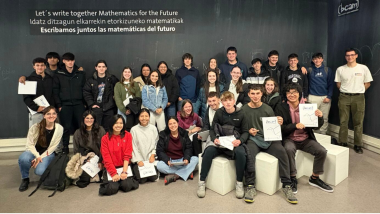Marcus Dahlenburg will defend his thesis on Monday, January 13th
- The defence will take place at Room 7 of the Doctoral School (Central Library Building) at 10:30 am.
Marcus Dahlenburg (Statistical Physics) will defend his doctoral thesis on Monday, January 13th in Room 7 of the Doctoral School (Central Library Building) at 10:30 am.
His PhD thesis, Displacement processes with random shifting and their applications, is under the supervision Gianni Pagnini (BCAM) and Ralf Metzler (University of Potsdam).
On behalf of all BCAM members, we would like to wish Marcus the best of luck in his upcoming thesis defense.
Abstract:
The thesis starts with a generalized model of Stochastic resetting that extends the classical concept through a random resetting amplitude. In particular there are two scenarios: independent and dependent Random amplitude stochastic resetting (RASR). A general analytical formalism of RASR is provided explicitly based on the first renewal picture, whereby the reduction to special cases is provided. The quantitative analysis is specified through the discussion of the mean value and the variance of the height in presence of a ballistic free propagation for Poissonian and constant pace resetting. These choices of resetting interval lengths are based on the geophysical application of sediment dynamics, in which the free propagation mimics the gradual increase (deposition) or decrease (erosion) of a sedimentation profile, whereas the resets represent an additional erosion mechanism. The latter mechanism could be seasonal (constant pace resetting) or random in time weather events such as extreme floods. The qualitative difference between independent and dependent RASR is that the latter class becomes stationary, whereas the former remains nonstationary. Apart from the above geophysical scenarios, this extension of the resetting dynamics can be applied to population dynamics interrupted by epidemics or crises-interrupted financial markets. All these applications correspond to the intermittent picture of a parent process with superimposed resetting statistic, which motivates the investigations of the RASR-model as a random search strategy.
The following chapter investigates the search properties of the continuous time random walk (CTRW), which can be derived from the independent RASR-class. The problem leads to the derivation of a nonhomogeneous Wiener-Hopf equation that exactly calculates the mean firstpassage time (MFPT). Apart from the fact, that the derived formalism may also be used for the indirect estimation of the jump-length PDF by assuming a given MFPT, it is shown by use of a specific jump-size PDF that the MFPT is infinite for symmetric random walks, but it becomes finite only for asymmetric jumps with a negative mean. Asymmetric jumps can be physically explained through an active movement as, e.g., chemotaxis or animal movement. However, for the quantitative description of molecular dynamics, symmetric CTRWs are presumed, for which the MFPT is not a proper quantity. In the subsequent chapters the author extended and modified these calculations for removing this failure of the MFPT for the investigation of symmetric random walks. In the fourth chapter of the thesis, a formalism for the calculation of the survival probability in firstpassage time problems for symmetric random walks in semi-infinite space is provided. Therefore, a Sturm-Liouville system of equations may provide the unique solution, which is shown for a concrete example of jump-size densities in the discrete time scenario. In addition, the Sturm-Liouville system is also derived for the survival probability of a CTRW. The previous example of jump-size PDF is applied also in the continuous-time setting for arbitrary waiting-time distribution, that holds for Markovian and non-Markovian CTRW. In the last chapter of this thesis, the MFPT of a CTRW in the presence of a uniformly moving target is discussed. Formally, the MFPT depends on the whole jump-sizes and waiting-times distributions within this configuration. Thus, the simple picture that emerged for a fixed target, when the MFPT depends on the mean waiting time, only, is (almost always) broken. Nevertheless, for a uniformly departing target, the MFPT of a CTRW may fulfil the property to be independent of the entire waiting-time PDF for a certain class of jump-size densities, that is derived within the thesis. Moreover, it is shown that the average of the entire process, i.e., jumps plus uniform movement must be negative to provide a finite MFPT, which is not satisfied by symmetric jump-size PDFs in the presence of a departing target. However, for an arriving target, the MFPT is finite even for symmetric CTRWs. This has been observed for a paradigmatic setting for waiting-time PDF and jump-size density, for which the exact result is provided analytically.
Related news
About the center
About the center




